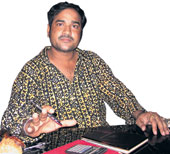 |
“Rashmoni Pandey
Cries on Monday.”
But the effect is rather joyful.
A class is in progress in a school somewhere in a village in West Bengal. The teacher, a young man with an infectious cheerfulness, walks into the classroom where an elephant, almost life-size, is painted on a wall, and asks the students’ names, in English, going up to them. “I am Chirojeet,” he says, pointing at himself. “And she is Rashmoni,” he says, pointing at a drawing next to the elephant.
This is the Rashmoni who cries every Monday. The little boys and girls double with laughter. This class actually took place; it was filmed and is part of a set of teacher training materials the British Council has developed for the teaching of English in primary schools across Bengal, in the hope that more such classes take place. The project English in the Primary Classroom — DVD Teacher Training Series, funded and put together in partnership with Paschim Banga Sarva Shiksha Mission and the West Bengal Board of Primary Education, was launched by education minister Bratya Basu in the city on Thursday.
Also present at the launch were Manik Bhattacharya, president, West Bengal Board of Primary Education, Arnab Roy, secretary, school education department, and Choten Dhendup Lama, state project director, Paschim Banga Sarva Siksha Mission.
The idea behind the project is to drive the fear of English out of young minds. However rampant the language may be in affluent, urban circles, or through mobile phones and technology, English still remains a bewildering foreign language to those trying to learn it from the textbook.
The methodology of the project, which evolved out of workshops and actual classroom experiences filmed for the DVDs, tries to make a friend out of the English language, a necessary skill in the contemporary world. Instead of encouraging learning by rote, traditional in Indian classrooms, the project insists on making lessons “activity-based” and “joyful”, with stories, poems, humour and any thing interesting.
The children are often broken up into small groups, so that the class doesn’t end up being a monologue by the teacher addressed to a large, unspecified class. Children are encouraged to speak more — the emphasis is on PTT (Pupils’ Talk Time). But the project also takes care of the teacher, so that he does not feel disempowered. He is reminded that he is the facilitator of the interaction and is also encouraged to be innovative.
So Rashmoni Pandey may appear in a very different avatar in another classroom and she may not cry on Mondays at all. She may fly, for all she cares, or just stick to prose.
And since the methodology is transferable — if this can be done with English, it can be done with other languages — teaching may change forever.
There is also room for the vernacular here. Sujata Sen, director, British Council East India, said that the teaching of English in all classrooms may not be possible entirely in Eng lish. So elements of the vernacular may be used.
The materials, consisting of a book and two DVDs, have been despatched to the 726 Circle Level Resource Centres run by Sarva Siksha Mission in Bengal. Teachers can get the materials from here and run the DVDs at home or where it is convenient.
The state machinery is backing the project. Minister Basu said it was necessary to reintroduce English because the Left government had stopped the teaching of English at the primary level. “The teaching of English should not take place at the expense of the mother tongue. But the mother tongue is our staple; shouldn’t one be entitled to five-star meals once in a while?” asked Basu.
He said that all primary teachers would be asked to go through the materials and send their comments to the D.I. in their areas.
Basu added that given the potential of this programme, the state government is aiming to develop a similar programme in maths, the other fear that dogs young minds.
After Tamil Nadu, Bengal is the second state in which the BCL has partnered an audio-visual project for teachers’ training. It is currently working in six states with its English training programmes for teachers.
Michael Connolly, assistant director, English Partnerships, British Council India, said, “This really is an innovative project and a great example of how we support states in developing a more de-centralised approach to teacher development, integrating new technologies and trialling new delivery models in the context of a teacher continuous professional development (CPD) framework.”
But will the project change classrooms? It will depend on the implementation, which is often the stumbling block. “It should work,” says a project official. “But you can only lead a horse to the water.”
Rashmoni, however, remains busy through the week. She cries on Mon-day, reads on Tues-day, smiles on Wed-nesday, jumps on Thurs-day, skips on Fri-day, sings on Sa-tur-day and plays on Sun-day.










